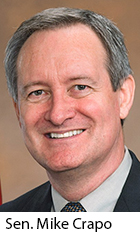
Senate Banking Committee Chair Crapo Outlines Housing Finance Reform Plan
Senate Banking Committee Chairman Mike Crapo, R-Idaho, on Friday released a much-anticipated framework for housing finance reform legislation, pushing the issue into the mix for the 116th Congress.
 “We must expeditiously fix our flawed housing finance system,” Crapo said. “My priorities are to establish stronger levels of taxpayer protection, preserve the 30-year fixed rate mortgage, increase competition among mortgage guarantors and promote access to affordable housing. I invite my Senate and House colleagues, the Administration and all interested stakeholders to work together to enact this critically needed reform.”
“We must expeditiously fix our flawed housing finance system,” Crapo said. “My priorities are to establish stronger levels of taxpayer protection, preserve the 30-year fixed rate mortgage, increase competition among mortgage guarantors and promote access to affordable housing. I invite my Senate and House colleagues, the Administration and all interested stakeholders to work together to enact this critically needed reform.”
The framework, which includes a great deal of alignment with the Mortgage Bankers Association’s 2017 GSE reform proposal (https://www.mba.org/issues/gse-reform), features a system in which well-capitalized, private guarantors issue and provide credit enhancement on securities that receive a full-faith-and-credit federal government guarantee through Ginnie Mae. It would also split the multifamily operations at the GSEs into separate guarantors.
MBA President and CEO Robert Broeksmit, CMB, issued a statement. “MBA welcomes the release of Chairman Crapo’s principles for housing finance reform as a significant sign of his continued commitment to work toward finally ending the conservatorships of Fannie Mae and Freddie Mac and ensuring a stable and liquid market–with an explicit, paid-for government guarantee–for both single-family and multifamily mortgages,” he said. “MBA looks forward to continuing to engage on a bipartisan basis with congressional leaders, the administration and other key stakeholders on reform efforts to create a system that supports borrowers, serves lenders of all sizes and business models and protects taxpayers.”
The Crapo proposal (https://www.banking.senate.gov/imo/media/doc/Housing%20Reform%20Outline.pdf) would create a “permanent, sustainable new housing finance system” that includes the following elements:
–Reduces the systemic, too-big-to-fail risk posed by the current duopoly of mortgage guarantors;
–Preserves existing infrastructure in the housing finance system that works well, while significantly increasing the role of private risk-bearing capital;
–Establishes several new layers of protection between mortgage credit risk and taxpayers;
–Ensures a level playing field for originators of all sizes and types, while also locking in uniform, responsible underwriting standards; and
–Promotes broad accessibility to mortgage credit, including in underserved markets.
Crapo’s proposal comes as Fannie Mae and Freddie Mac are now in their 10th year of conservatorship under the Federal Housing Finance Agency. While efforts at housing finance reform sputtered in the 113th, 114th and 115th Congresses, the 2018 elections triggered a renewed interest in a legislative solution, with both Crapo and new House Financial Services Committee Chairwoman Maxine Waters, D-Calif., saying reform would be a priority in their respective committees.
The Trump Administration has shown renewed interest as well; last month, Acting FHFA Director Joseph Otting told FHFA staff that the Administration would be putting forth its own housing finance proposal as early as February, although neither Otting nor other Administration officials have provided any details as of yet.
“We have engaged in a robust process over the past several Congresses on housing finance reform, holding many hearings, briefings, meetings and negotiations,” Crapo said. “The time is now to resolve this issue and I look forward to working with my colleagues as we move forward.”
The Banking Committee’s Ranking Member, Sen. Sherrod Brown, D-Ohio, said he looked forward to working with Crapo on the proposal, but said any proposal must have a strong affordable housing element.
“I will fight to ensure that any efforts to reform the housing market start by addressing the affordability crisis that is hurting too many renters and homeowners across this country,” Brown said in a statement. “Too often Congress and the White House have put Wall Street ahead of working people, and we cannot let that happen when it comes to the stability of our housing market. Failure to put working people first would threaten access to affordable homeownership and rental housing, put the viability of the 30-year mortgage at risk and hit lower income communities, communities of color, and rural Americans particularly hard.”
